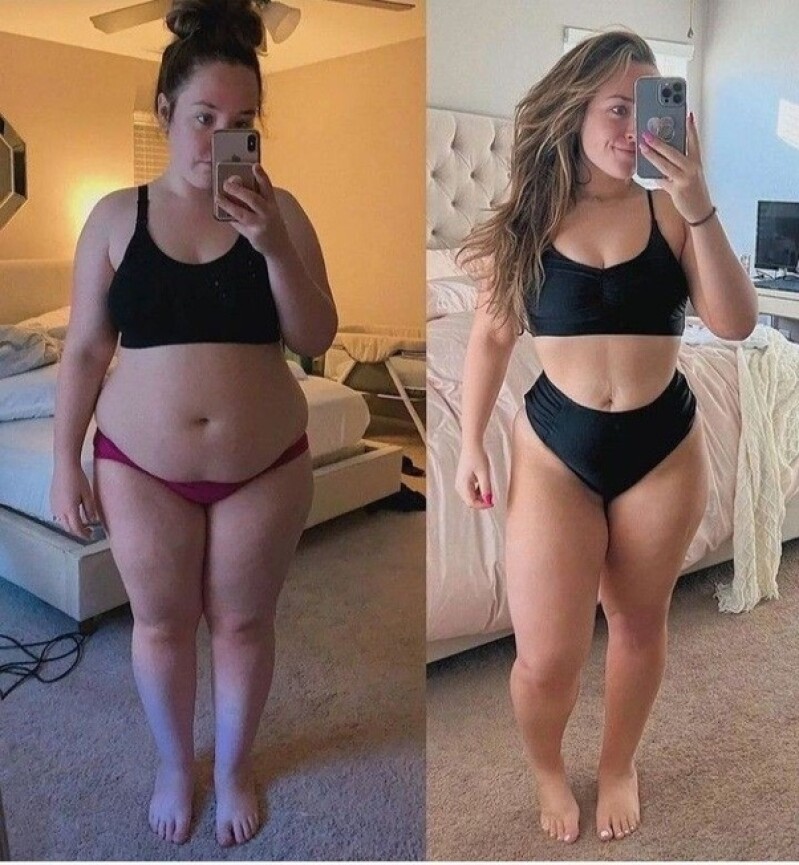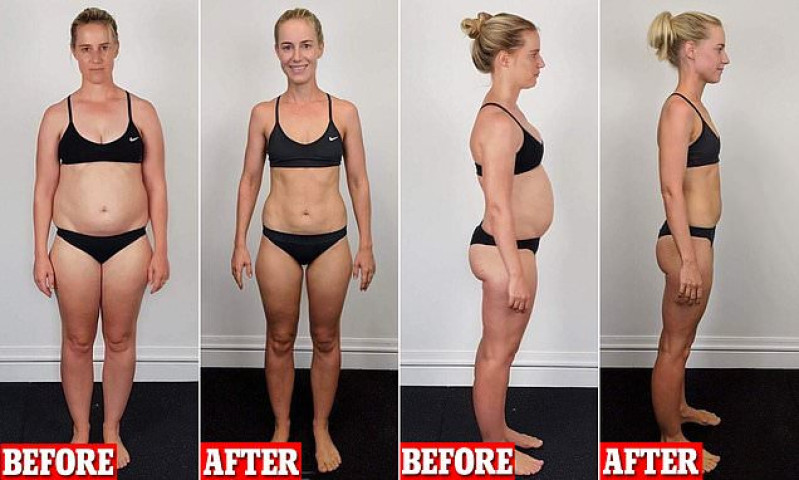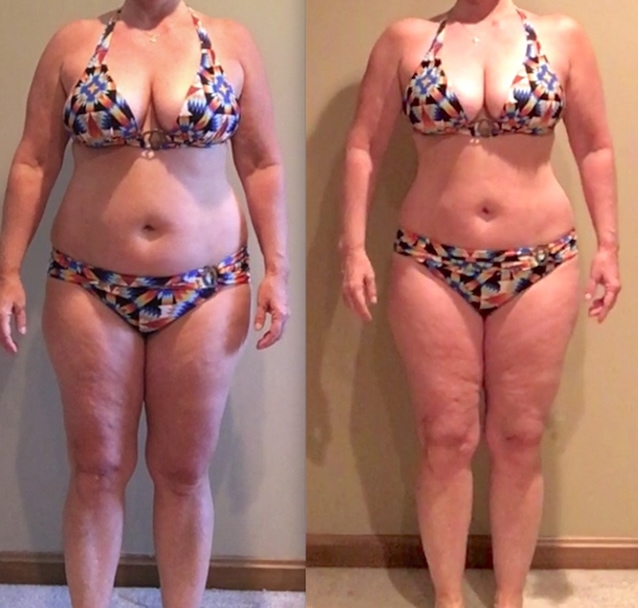
Starting an 8 Week Weight Loss Journey can really change your life. It’s not just about losing weight; it’s about changing the way you think about health and fitness. But it requires commitment to exercise and a healthy diet. This guide is here to give you the basics. You’ll find tips, advice, and the motivation you need to get through these 8 weeks weight loss journey. Let’s get started.

Photo Credit: Instagram
Start Your 8 Week Weight Loss Journey by Setting Goals
Starting an 8-week weight loss journey can change your life. The first step? Setting your goals. Know what you want to achieve and how you’ll get there. With a good plan and the right mindset, you’ll see big changes in just two months.
Set Realistic Expectations
Realistic expectations are key. Unrealistic goals can lead to disappointment. Understand your body’s limits and your lifestyle. Aim to lose 1-2 pounds per week. Here’s how:
-
Know your starting point: Check your current weight and fitness level.
-
Set achievable targets: Go for small, steady changes instead of drastic weight loss.
-
Consider your schedule: Make sure your goals fit into your daily life.
Track your progress. Use a journal or an app to note your daily activities. Celebrate small wins. It keeps you motivated and focused on your long-term goals.
|
Week |
Goal |
|---|---|
|
1-2 |
Lose 2-4 pounds |
|
3-4 |
Lose 2-4 pounds |
|
5-6 |
Lose 2-4 pounds |
|
7-8 |
Lose 2-4 pounds |
Create A Personalized Plan
A personalized plan is a must for effective weight loss. Everyone’s body is different. A plan that fits your needs gives the best results. Start with a balanced diet and regular exercise. Here’s what you should do:
-
Assess your diet: Spot unhealthy eating habits and replace them with healthy options.
-
Plan your meals: Prepare balanced meals with proteins, carbs, and fats.
-
Set a workout routine: Mix cardio, strength training, and flexibility exercises.
Consistency is everything. Stick to your plan even on busy days. Prepare meals ahead of time and schedule workouts like appointments. This keeps you on track. Don’t forget to rest. Recovery days are as important as workout days. They help your muscles heal and prevent burnout. Listen to your body and give it the rest it needs.
Track your progress. Regularly check your weight and adjust your plan if needed. Stay flexible in your approach. It helps you stay committed and reach your goals.
Nutrition And Meal Planning For 8 Week Weight Loss Journey
Let’s talk about the key role of nutrition and meal planning. Focusing on what you eat can make a huge difference in your weight and health. Here’s how to create a meal plan that works.
Understanding Caloric Deficit
To lose weight, you need a caloric deficit. Simply put, eat fewer calories than your body needs to stay the same weight. Your body will then start using stored fat for energy, leading to weight loss.
Here are the basics:
-
Calculate your daily caloric needs: Use online tools to find your Basal Metabolic Rate (BMR).
-
Set a realistic calorie goal: Aim to cut 500-1000 calories a day for a safe weight loss of 1-2 pounds per week.
-
Track your intake: Use apps or food journals to keep an eye on your daily calorie consumption.
Consider this example:
|
Age |
Weight |
Height |
Activity Level |
Daily Caloric Needs |
|---|---|---|---|---|
|
30 |
180 lbs |
5’8″ |
Moderate |
2500 calories |
If you need 2500 calories a day, aim for 2000-1500 calories to create that deficit. Consistency is key.
Balanced Meal Preparation
Balanced meals are important. They give you the nutrients you need without too many calories. Here’s how to prepare them:
Start with the right proportions:
-
Protein: Lean sources like chicken, fish, beans, or tofu. About 3-4 ounces per meal.
-
Carbohydrates: Whole grains, fruits, and veggies. Moderate portions, like 1/2 cup of grains or one medium fruit.
-
Fats: Healthy fats like avocados, nuts, and olive oil. Small portions, such as 1 tablespoon of oil or 1/4 cup of nuts.
Here’s a sample meal plan:
|
Meal |
Food Items |
|---|---|
|
Breakfast |
Oatmeal with berries and a boiled egg |
|
Lunch |
Grilled chicken salad with mixed greens and vinaigrette |
|
Dinner |
Baked salmon, quinoa, and steamed broccoli |
Prep your meals in advance. Cook in bulk and portion out servings for the week. This saves time and reduces the temptation to eat unhealthy foods.
Stay hydrated. Drink plenty of water. Sometimes thirst feels like hunger. Aim for at least 8 glasses a day.
Follow these tips, and you’ll create a meal plan that supports your weight loss goals and keeps you healthy.
Exercise Regimen
A big part of this weight loss journey is your exercise plan. A good workout routine does more than just burn calories. It builds muscle, speeds up your metabolism, and boosts your overall health. Let’s talk about the kinds of workouts you can do and why sticking with them is so important.
Types of Workouts
Choosing the right workouts is key to losing weight and getting fit. Here are some workouts to add to your 8-week plan:
-
Cardio Exercises: Running, cycling, and swimming. Great for burning calories and good for your heart.
-
Strength Training: Lifting weights or using resistance bands. Helps build muscle, which boosts your metabolism.
-
HIIT (High-Intensity Interval Training): Short bursts of intense exercise followed by rest. Burns lots of calories fast.
-
Flexibility and Balance: Yoga and Pilates. Improves flexibility, reduces stress, and makes you feel better overall.
Here’s an example of what a weekly workout plan might look like:
|
Day |
Workout Type |
|---|---|
|
Monday |
Cardio (Running, 30 minutes) |
|
Tuesday |
Strength Training (Upper Body) |
|
Wednesday |
HIIT (20 minutes) |
|
Thursday |
Flexibility (Yoga, 30 minutes) |
|
Friday |
Cardio (Cycling, 30 minutes) |
|
Saturday |
Strength Training (Lower Body) |
|
Sunday |
Rest or Light Activity (Walk, 30 minutes) |
Importance of Consistency
Staying consistent is crucial to hitting your weight loss goals. Regular workouts mean you’re always burning calories and building muscle. Here are some tips to help you stay on track:
-
Set Realistic Goals: Small, achievable milestones keep you motivated.
-
Track Your Progress: Use a journal or app to log workouts and see how you’re improving.
-
Create a Schedule: Plan your workouts for the same time each day. It helps build a routine.
-
Find a Workout Buddy: Exercising with a friend can make it more fun and keep you accountable.
The good news? Consistency helps you form long-term habits. Even after the 8 weeks, these habits can keep you on the path to weight loss and better health. Every workout counts. Even on days when you’re not feeling it, a short session is better than none. Celebrate the small victories and stick with your fitness journey. You’ve got this!

Tracking Progress
Keeping track of your progress is key. It helps you stay motivated and make necessary tweaks along the way.
Using Technology to Track Progress
These days, technology can be a big help. Your smartphone and fitness gadgets offer many apps and tools. They make tracking easier and more accurate.
Here are some tools you might find useful:
-
Fitness Apps: Try MyFitnessPal, Lose It!, or Fitbit. They help with calorie counting, exercise logging, and progress reports.
-
Wearable Devices: Smartwatches and fitness bands can track your steps, heart rate, and sleep. They provide a lot of health data.
-
Smart Scales: These scales measure weight, body fat, and muscle mass. They sync with apps for easy tracking.
Comparison Of Popular Fitness Apps
|
App |
Features |
Cost |
|---|---|---|
|
MyFitnessPal |
Calorie counting, exercise logging, community support |
Free with premium options |
|
Lose It! |
Food tracking, goal setting, meal planning |
Free with premium options |
|
Fitbit |
Activity tracking, heart rate monitoring, sleep analysis |
Device purchase required |
Using these tools keeps you informed about your progress. It makes it easier to stay on track and reach your goals.
Also Read : Inspiring Weight Loss Journey Of Jaicy Elliot
The Importance of Non-Scale Victories
Don’t just focus on the scale. It can be discouraging. Non-scale victories (NSVs) can give you extra motivation and a sense of achievement.
What are NSVs? Here are some examples:
-
Increased Energy Levels: Feeling more energetic throughout the day.
-
Improved Physical Fitness: Better stamina during workouts.
-
Clothing Fit: Clothes fitting better or needing smaller sizes.
-
Enhanced Mood: A more positive outlook and reduced stress levels.
Record these victories in a journal or an app. Celebrate each one, no matter how small. It helps keep you motivated and encourages a positive mindset.
By including NSVs in your tracking, you get a more complete view of your journey. You recognize and celebrate all forms of progress, not just the number on the scale.
Challenges And Roadblocks
Going on an 8-week weight loss journey can change your life. The before and after pictures? They tell amazing stories. But let’s be real, it’s not always a smooth ride. You’ll face some bumps along the way. Understanding these bumps can make all the difference.

Common Obstacles
Here are some common obstacles people face:
-
Lack of Motivation: At first, you’re excited. But it fades. Staying committed gets tough.
-
Cravings and Temptations: Junk food cravings can mess up your progress.
-
Time Management: Busy lives mean less time for meal prep and exercise.
-
Plateaus: Sometimes, your weight loss just stops. It’s frustrating.
-
Social Pressures: Parties and gatherings often mean unhealthy eating.
Knowing these obstacles ahead of time? It helps you plan better. Let’s dive into these challenges a bit more:
|
Obstacle |
Description |
|---|---|
|
Lack of Motivation |
Excitement fades, making it tough to stay on track. |
|
Cravings |
Desire for unhealthy foods can interrupt progress. |
|
Time Management |
Busy lives make it hard to stick to plans. |
|
Plateaus |
Weight loss halts, causing demotivation. |
|
Social Pressures |
Events and gatherings can challenge healthy routines. |
Strategies For Overcoming Plateaus
Plateaus are common but manageable. Here’s how:
-
Adjust Caloric Intake: Sometimes, cutting calories can kickstart weight loss again.
-
Change Your Workout Routine: New exercises can surprise your body and help shed pounds.
-
Increase Protein Intake: Protein builds muscle, which boosts metabolism.
-
Get Enough Sleep: Sleep is key for recovery and keeping your metabolism in check.
-
Stay Hydrated: Water helps with digestion and reduces cravings.
Plateaus can be annoying, but they’re just temporary. Stick with it and be flexible. Here’s a quick reference:
|
Strategy |
Details |
|---|---|
|
Adjust Caloric Intake |
Lowering calories can restart weight loss. |
|
Change Workout Routine |
New exercises can shock the body. |
|
Increase Protein Intake |
Protein boosts muscle building and metabolism. |
|
Get Enough Sleep |
Essential for recovery and metabolism. |
|
Stay Hydrated |
Aids digestion and reduces cravings. |
Use these tips to beat plateaus and hit your weight loss goals. You’ve got this!
Also Read: How Detox Tea Helps in Losing Weight So Fast
Maintaining Weight Loss
Congratulations on making it through your 8-week weight loss journey! Now comes the next challenge: keeping the weight off. Let’s talk about some ways to make sure your hard work pays off in the long run.
Building Habits That Stick
Quick fixes and fad diets might give you temporary results. But for lasting success, you need habits you can keep up for life. Here’s how:
-
Balanced Diet: Eat a variety of foods. Think fruits, veggies, lean proteins, and whole grains.
-
Regular Exercise: Aim for 30 minutes of moderate activity most days. A walk in the park works wonders!
-
Stay Hydrated: Drink lots of water. It helps your metabolism and keeps you feeling full.
-
Mindful Eating: Listen to your body’s hunger and fullness signals. Don’t eat just because you’re bored.
Need help planning meals? Try something simple like this:
|
Meal |
Example |
|---|---|
|
Breakfast |
Oatmeal with berries and nuts |
|
Lunch |
Grilled chicken salad with mixed greens |
|
Dinner |
Baked salmon with quinoa and broccoli |
|
Snacks |
Greek yogurt, apple slices, nuts |
Keep track of what you eat and your workouts. Use a journal or an app. It keeps you accountable.
Avoiding the Dreaded Rebound
Gaining back the weight you lost is a common worry. Here’s how to keep it off:
-
Consistent Routine: Stick to a regular eating and exercise schedule. Your body will thank you.
-
Portion Control: Watch your portions. Even healthy foods can add up if you eat too much.
-
Regular Check-ins: Weigh yourself weekly. Catch small gains before they turn into big problems.
-
Stress Management: Stress can lead to emotional eating. Try yoga or meditation to keep calm.
Having a support system makes a huge difference. Surround yourself with friends or family who support your healthy lifestyle. Maybe even join a support group or work with a coach for extra motivation.
Remember, maintaining your weight loss is a journey. Celebrate your progress and stay dedicated to your healthy habits. You’ve got this!
Celebrating Success
Completing an 8-week weight loss journey is a big deal. It’s tough, but the rewards are worth it. It’s time to celebrate your hard work and success. Recognizing what you’ve achieved can keep you motivated to stay healthy.
Looking Back on Your Progress
Think about what you’ve accomplished. An 8-week journey isn’t easy. Here are some common milestones people hit:
-
Weight Loss: Many folks drop between 10-20 pounds.
-
More Energy: Daily energy levels often get a big boost.
-
Better Fitness: You might notice improved strength and stamina.
-
Happier Mood: Less stress and anxiety, better overall mental health.
Tracking your progress can help. A simple table might work:
|
Week |
Weight Loss (lbs) |
Energy Levels |
Fitness Improvement |
|---|---|---|---|
|
1 |
2 |
Low |
Slight |
|
4 |
8 |
Moderate |
Noticeable |
|
8 |
15 |
High |
Significant |
Reflect on these achievements every day. Celebrate even the small wins. This will keep you committed. Share your success with friends and family. It helps build a support system and keeps you motivated.
Setting New Goals
Now that you’ve celebrated, it’s time to set new goals. This keeps you moving forward. Here are some tips for setting good goals:
-
Be Specific: Instead of “stay fit,” try “run 3 miles daily.”
-
Measurable: Track progress with numbers, like losing 5 pounds in a month.
-
Achievable: Make sure your goals are realistic.
-
Relevant: Align goals with your overall health vision.
-
Time-Bound: Set deadlines to stay focused.
A table can help outline your new goals:
|
Goal |
Target Date |
|---|---|
|
Lose 5 pounds |
End of Month 1 |
|
Run 3 miles daily |
End of Month 2 |
|
Improve muscle strength |
End of Month 3 |
Setting new goals ensures you keep improving. Stay committed to your health journey. Each new milestone brings you closer to your vision of health and wellness.
Frequently Asked Questions
How Much Weight Could I Lose In 8 Weeks?
You can lose 8-16 pounds in 8 weeks with a healthy diet and regular exercise. Always consult your doctor first.
Can I See Weight Loss Results In 8 Weeks?
Yes, you can see weight loss results in 8 weeks. Consistent diet and exercise can lead to noticeable changes. Consult a health professional for personalized advice.
How Much Can My Body Change In 8 Weeks?
Your body can see significant changes in 8 weeks. Expect weight loss, muscle gain, improved endurance, and better overall fitness. Results vary based on diet, exercise, and individual effort. Consistency and dedication are key to achieving noticeable changes within this period.
Can I Lose 15 Lbs In 8 Weeks?
Yes, you can lose 15 lbs in 8 weeks. Focus on a balanced diet, regular exercise, and proper hydration. Consult a healthcare professional for personalized advice.
What Is An 8-week Weight Loss Plan?
An 8-week weight loss plan is a structured program designed to help individuals lose weight in two months.
How Much Weight Can I Lose In 8 Weeks?
You can lose 8-16 pounds in 8 weeks with a balanced diet and regular exercise.
What Are The Benefits Of An 8-week Plan?
The benefits include improved health, increased energy, and better eating habits.
Conclusion
Achieving an 8 week weight loss journey is possible with dedication and the right plan. Consistency and a balanced approach are essential. Celebrate small victories and stay motivated. Remember, every step counts towards your goal. Start your journey today and witness your incredible before and after results.









